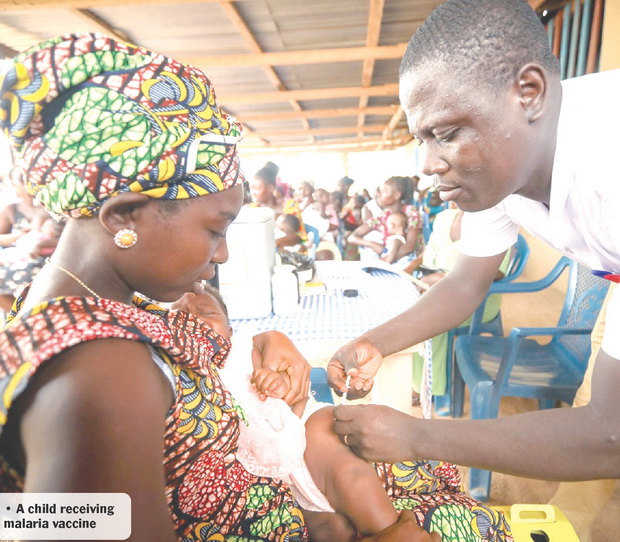
1.4 Million doses of malaria vaccines administered in 2022
A total of 1.4 million doses of the malaria vaccine recommended by the World Health Organisation (WHO) have been administered to eligible children as of December 2022.
Children that have received at least one dose were 459,446 with 184,418 children completing all four doses.
Advertisement
The vaccination was done under a malaria vaccine implementation programme launched in May 2019 in 42 districts across seven regions aimed at preventing malaria and reducing life-threatening severe malaria in children.
The malaria vaccine programme is also being implemented in countries such as Kenya and Malawi with more than 1.2 million children being reached with at least one dose of the malaria vaccine.
It is being coordinated by WHO and supported by PATH, a non-profit organisation, UNICEF; GlaxoSmithKline, the manufacturer of the vaccine and other stakeholders, with funding provided by Gavi, the Global Fund and Unitaid.
The WHO recommended the malaria vaccine, Mosquirix- RTS, S, as the first vaccine approved to prevent malaria and reduce life-threatening severe malaria in children.
Programme expansion
At an event to launch the expansion of the malaria vaccine implementation programme, the WHO Representative to Ghana, Dr Francis Kasolo, said the expansion of the programme would help to save thousands of lives each year.
He said the expansion would see the delivery of malaria vaccines to children in 51 additional districts in the seven regions.
Dr Kasolo noted that the introduction of the malaria vaccine through national immunisation programmes in Ghana, Kenya and Malawi had resulted in a substantial reduction in deadly severe malaria, with a drop in child hospitalisations and a reduction in child deaths.
“The malaria vaccine is a welcome addition to the malaria control toolbox and will offer endemic countries the opportunity to rapidly reach children in the most vulnerable places with an effective intervention through the routine immunisation platform," he said.
He said the implementation programme, which would come to an end in December 2023, had provided crucial information for other malaria-endemic countries in sub-Saharan Africa to roll out the malaria vaccine from 2024.
“It is critical for all stakeholders to spread the importance of the malaria vaccine and all childhood immunisations in protecting the lives and livelihoods of our children and future generations,” Dr Kasolo added.
Launch
He said the government expanded the National Malaria Vaccine Immunisation Programme to deliver malaria vaccines to thousands of children at high risk of malaria illness and death.
Launching the expansion of the programme, the Minister of Health, Kwaku Agyeman-Manu, underscored the significance of the malaria vaccine as an intervention towards the elimination of malaria.
“Vaccination saves children's lives; it is one of the most cost-effective public health interventions and the best way to help children to survive.
“I urge all caregivers and parents to take full advantage of this opportunity and ensure that they send their eligible children to the Child Health and Nutrition clinics, popularly known as Child Welfare Clinics (CWC), to be vaccinated against malaria,” he added.




